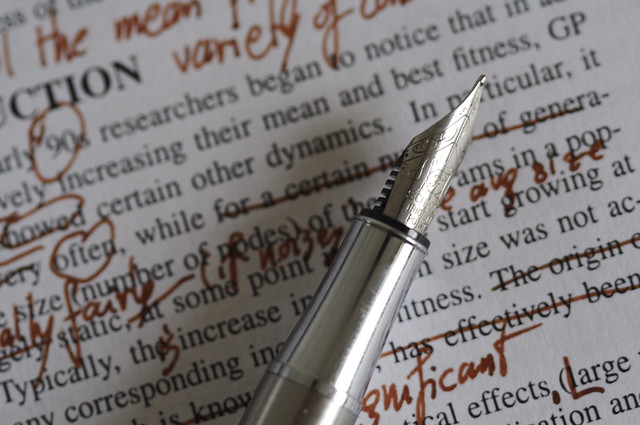
The first agent I met at a 1990’s writers’ conference table glowed after hearing my novel pitch. She loved the idea, a Shakespearean tragedy with Ninja warriors on a science fiction world. So I handed her my the first chapter. She read, scowling, and thrust it back saying, “Adverbs, adverbs, everywhere… kill ‘em, then stop by again.”
Confused, I skulked away. Kill adverbs? Why limit your linguistic toolkit?
Well, that agent was right. Overusing adverbs weakens your writing. To Illustrate, I lifted some text from an early-draft of a thriller I started but lost interested in. The section isn’t bad. And yet, it contains three “problem” adverbs that weaken the writing. These problems many plague writer’s group submissions I’ve read.
Time to learn why adverbs suck. And improve this paragraph along the way. First, meet the victim...
Sample Paragraph: He ran quickly through the field, ducking behind a bush. The camp was deadly quiet. He glanced through the branches warily, making sure he wasn’t seen.”
Now, let's get to work...
Rules of Thumb for Killing Adverbs
First, let’s illustrate how adverbs harm writing and rules of thumb to help you understand how and why you should correct them. And then, I end this post with some caveats. Since while abuse of adverbs weakens writing, they do have their places.Now, onto the rules of thumb,
1) Use stronger verbs.
Example 1.1:
Original : “He RAN QUICKLY through the field, ducking behind a bush.”
Corrected: “He dashed through the field, ducking behind a bush.”
Resultant text is shorter, cleaner and more evocative. “Dashed” creates precise emotional coloration.
FYI: “Dashed” is not the only word that works. Other possibilities include “dart,” “sprint,”etc.
Each “feels” different… at least to a word-nerd like me.
2) “Show” your audience, instead of using adverbs to “Tell” them
Example 2.1:
Original: “The camp was DEADLY QUIET.”
“Deadly” tells us, without sense input, how “quiet” it is. It is a judgement.
Corrected: “The camp was hushed as if deserted, devoid of the rustlings of sleepers and the glow of their smart-phones.”
It’s wordier, but it is concrete, showing how the camp looks and sounds. You invite readers to judge for themselves if the camp is “deadly quiet.”
Example 2.2:
Original: “He glanced through the branches warily, making sure he wasn’t seen.”
“Warily” is the narrator’s judgement about how the point-of-view character glanced.
Corrected: “So he turned back to the scrubby field, eyes darting to and fro as he scanned through the branches for pursuers.”It’s wordier, but it shows how the point-of-view character thinks and acts. You invite readers to judge for themselves if he’s “warily glancing.”
Now, compare both versions.
Before: “He ran quickly through the field, ducking behind a bush. The camp was deadly quiet. So John glanced through the branches warily, scanning for pursuers.”Whereas Before "tells" you that the point-of-view character "looks around warily in the deathly silence," After is more concrete. It dramatizes the point-of-view character's situation, and uses sense data to illustrate his wary gaze in the deathly silence.
After: “He dashed through the field, ducking behind a bush. The camp was hushed as if deserted, devoid of the rustlings of sleepers and the glow of their smart-phones. So he turned back to the scrubby field, eyes darting to and fro as he scanned through the branches for pursuers.”
And Yet, When Used Right, Adverbs Don’t Suck (in fact, they're often indispensable)
Caveat: Not all adverbs are bad. They can be essential.
Used EFFECTIVELY (see that… an adverb used EFFECTIVELY), adverbs are often the precise word you need.
Example 3.1:
“Did you do your homework?” John’s mother asked, clearing his plate.Observation: “Already” and “before” are adverbs. And you can say, “Already done, before dinner,” without adverbs. It's awkward.
He slouched into his chair. “ALREADY done, BEFORE dinner.”
Example 3.1, Adverb-Free:
“Did you do your homework?” John’s mother asked, clearing his plate.
He slouched into his chair. “We ate dinner at 6:07 PM. And I completed my homework at 5:42 PM. So there is no need for me to do homework this evening, Mother.”
Wow.
The adverb-free version is more accurate than the original. And, like the examples above. removing the adverbs makes the text more specific. However, nobody speaks like this.
Unless, of course, that character is Robbie the Robot.
Bottom line on adverbs
Take this advice for its two-bits’ value. Because some successful writers gush adverbs to make their purple prose purplier. Examples include China Mieville, whom I love. And Stephanie Meyers, who I don’t. But many a teen girl does.
Both outsell me. And out-earn most editors and agents.
Go figure.
So I’ll leave you with an adverb-laden section from Stephanie Miller’s Twilight. If this showed up in my writer’s group, it would come back to Meyers marked blood-red.
“Edward in the sunlight was shocking. I couldn’t get used to it, though I’d been staring at him all afternoon. His skin, white despite the faint flush from yesterday’s hunting trip, LITERALLY sparkled, like thousands of tiny diamonds were embedded into the surface. He lay PERFECTLY still in the grass, his shirt open over his sculpted, incandescent chest, his scintillating arms bare. His glistening, pale lavender lids were shut, though of course he didn’t sleep. A perfect statue, carved in some unknown stone, smooth like marble, glittering like crystal.”
Groan.
I give up... :-)
Contributed by Leo Walsh
Follow him at http://www.leo-walsh.com/

No comments:
Post a Comment